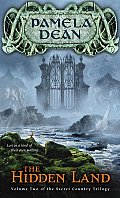
| Series: | Secret Country #2 |
| Publisher: | Firebird |
| Copyright: | 1986 |
| ISBN: | 0-14-250143-3 |
| Format: | Mass market |
| Pages: | 257 |
Predictably, given how The Secret Country ended, The Hidden Land picks up immediately afterwards (at least plot-wise; there's a small break in the chronology and an initial recap chapter). The author's note at the end of The Hidden Land does explain the frustrating break: this is the last third of what was originally a single book. It's best read that way, back to back with The Secret Country, since the publishers did an even worse job of choosing how to break up a long book than they usually do.
Because it's really the end of the previous book, The Hidden Land doesn't introduce many new themes or predicaments. The plot accelerates, the critical points in the children's story that they're trying to change and influence arrive, and the threatened war with the Dragon King starts. The pacing is therefore tighter, which makes the story more engrossing, and there's a bit more resolution and a bit less mystery. I found myself less confused by the underlying story the protagonists discuss, in part because we're reaching the critical events of the story they plotted out so they do less jumping around in time when discussing it.
As with The Secret Country, we mostly follow Ted and Laura out of the five children. Ted, being the heir to the throne, a member of the king's council, and knee-deep in the middle of the plot events is an excellent choice. Laura continues to frustrate me. She struggles with finding ways to take an active role in what's happening, tends to be a bit belittled by the other characters, and is still defined and characterized by her constant clumsiness. She's still unhappy or miserable for much of the book, which is not comfortable reading. Usually this sort of introductory characterization is setting up strong rising emotion when everything clicks and she finally comes into her own, but it hasn't happened yet. I'm getting a bit impatient for it.
It became clear towards the end of The Secret Country that the children's story is being altered somehow, and by more than just their actions in the world. That becomes more prominent and obvious here, particular at the end of The Hidden Land. It's not resolved, but it's set up for handling in the third book of the trilogy. I think I like where Dean is going with that metafictional part of the plot, although so far the villain is hissible and one-sided.
The author's note at the end of the book is useful for getting a handle on where Dean is trying to go:
The Hidden Land is also the place in this long story where a predicament earlier confined to the characters spread out to encompass the author as well. One might phrase it this way: What is the responsibility of imagination?
This is the characters' world: they invented it and gave it shape, and they put into motion the events they're now living through. They're now experiencing the emotional impact and implications of those events, which are stronger when one doesn't have the storyteller's abstraction. The tension, since the middle of The Secret Country, has been between getting out of this world (which is often dangerous) and back to their regular lives or staying and further immersing in the world to try to fix it, protect it, or just live in it. Patrick, of all the children, represents the practical and skeptical outlook, which is part of why he's so frustrating to a fantasy reader. He thinks this is all imaginary, and his first goal is getting out of it and back to the real world. The reader obviously doesn't want this to happen, since the real world is boring by comparison and isn't where the story is happening. The other children are torn and diverge further in their opinions in this book.
Dean pulls this off better in some places than in others, and it can get a touch frustrating for the reader, but it also creates an interesting story dynamic. The characters have power and choice in a way that normally they don't in a portal fantasy. Rather than having vast unexplained powers in the world (they have some, but they're not vast and they're hard to control), they have the potential of more basic power over the world. They can try to leave, which in some way would abandon the story.
This is a bit more told than shown, unfortunately, and that plus Laura's continued unhappiness are for me the main flaws in this series to date. I like the idea, I generally like the characters, and I want it to all come together under the overarching theme, but so far it's not quite done so. Parts work, parts don't, and the overall feeling is uneven. The ending of The Hidden Land places that overarching theme in sharp relief, though, and I have hopes for the third and final book.
Followed by The Whim of the Dragon.
Reviewed: 2010-05-17